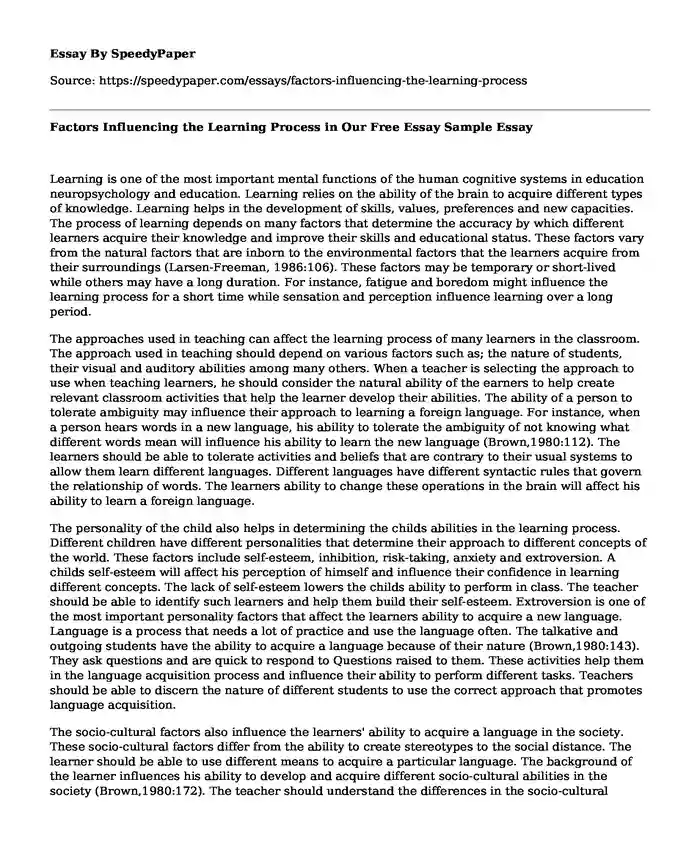Learning is one of the most important mental functions of the human cognitive systems in education neuropsychology and education. Learning relies on the ability of the brain to acquire different types of knowledge. Learning helps in the development of skills, values, preferences and new capacities. The process of learning depends on many factors that determine the accuracy by which different learners acquire their knowledge and improve their skills and educational status. These factors vary from the natural factors that are inborn to the environmental factors that the learners acquire from their surroundings (Larsen-Freeman, 1986:106). These factors may be temporary or short-lived while others may have a long duration. For instance, fatigue and boredom might influence the learning process for a short time while sensation and perception influence learning over a long period.
The approaches used in teaching can affect the learning process of many learners in the classroom. The approach used in teaching should depend on various factors such as; the nature of students, their visual and auditory abilities among many others. When a teacher is selecting the approach to use when teaching learners, he should consider the natural ability of the earners to help create relevant classroom activities that help the learner develop their abilities. The ability of a person to tolerate ambiguity may influence their approach to learning a foreign language. For instance, when a person hears words in a new language, his ability to tolerate the ambiguity of not knowing what different words mean will influence his ability to learn the new language (Brown,1980:112). The learners should be able to tolerate activities and beliefs that are contrary to their usual systems to allow them learn different languages. Different languages have different syntactic rules that govern the relationship of words. The learners ability to change these operations in the brain will affect his ability to learn a foreign language.
The personality of the child also helps in determining the childs abilities in the learning process. Different children have different personalities that determine their approach to different concepts of the world. These factors include self-esteem, inhibition, risk-taking, anxiety and extroversion. A childs self-esteem will affect his perception of himself and influence their confidence in learning different concepts. The lack of self-esteem lowers the childs ability to perform in class. The teacher should be able to identify such learners and help them build their self-esteem. Extroversion is one of the most important personality factors that affect the learners ability to acquire a new language. Language is a process that needs a lot of practice and use the language often. The talkative and outgoing students have the ability to acquire a language because of their nature (Brown,1980:143). They ask questions and are quick to respond to Questions raised to them. These activities help them in the language acquisition process and influence their ability to perform different tasks. Teachers should be able to discern the nature of different students to use the correct approach that promotes language acquisition.
The socio-cultural factors also influence the learners' ability to acquire a language in the society. These socio-cultural factors differ from the ability to create stereotypes to the social distance. The learner should be able to use different means to acquire a particular language. The background of the learner influences his ability to develop and acquire different socio-cultural abilities in the society (Brown,1980:172). The teacher should understand the differences in the socio-cultural nature of the learners to develop integrative approaches that promote uniformity in the language acquisition in the classroom.
References
Brown, H. D. (1980). Principles of language learning and teaching. Englewood Cliffs, NJ: Prentice-Hall.
Larsen-Freeman, D. (1986). Techniques and principles in language teaching. New York, N.Y.: Oxford University Press.
Cite this page
Factors Influencing the Learning Process in Our Free Essay Sample. (2019, May 29). Retrieved from https://speedypaper.net/essays/factors-influencing-the-learning-process
Request Removal
If you are the original author of this essay and no longer wish to have it published on the SpeedyPaper website, please click below to request its removal:
- Free Essay on Nokia: Information Systems Management and Determining Banking Partners
- Why Pride and Prejudice Is Still Popular Today? Literary Essay Sample
- Essay Example on Changing the Social Welfare System
- Essay Example: My Career Goals
- Free Essay with a Speech on Creative Ways of Becoming Successful Event Manager
- Free Essay: The Laws, Rules, and Principles Governing the Use of Force under International Law
- Research Proposal Sample on Early Intensive Intervention for Children with ASD
Popular categories





